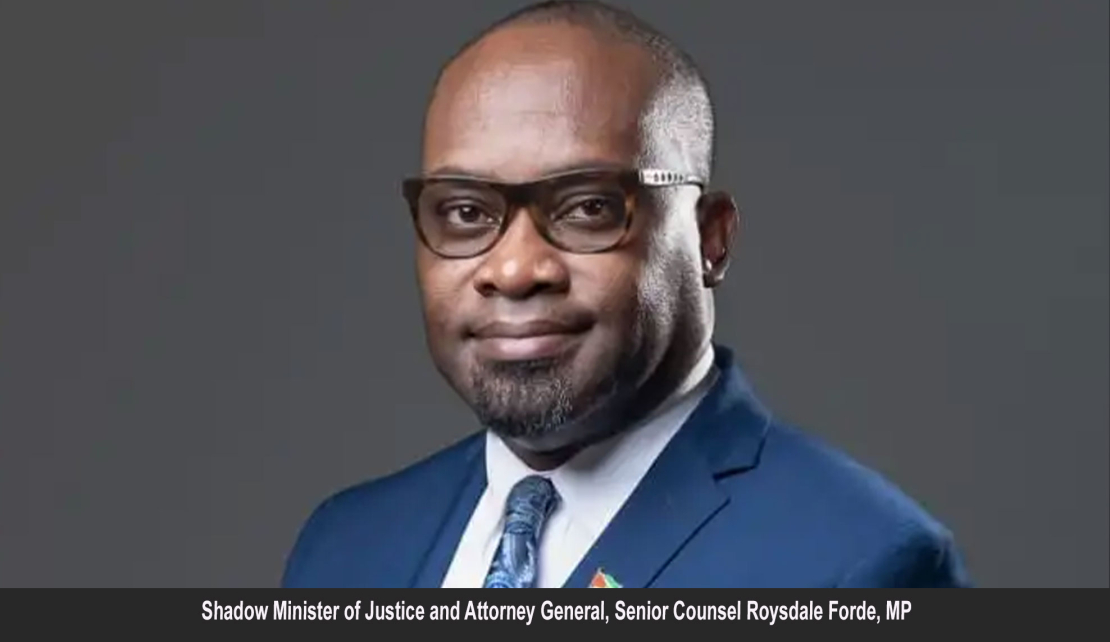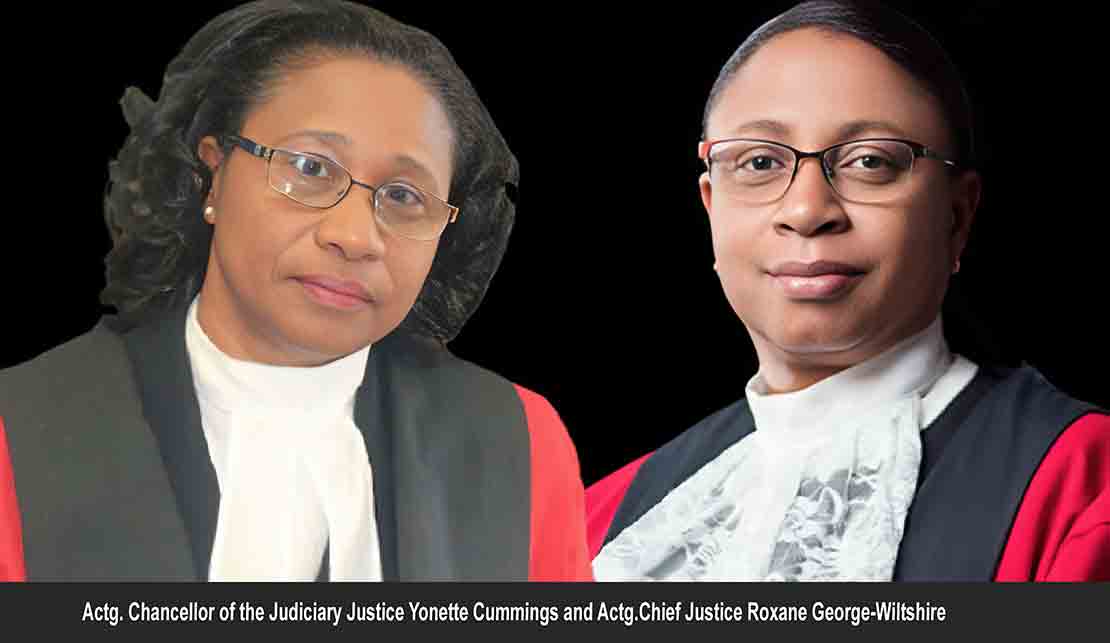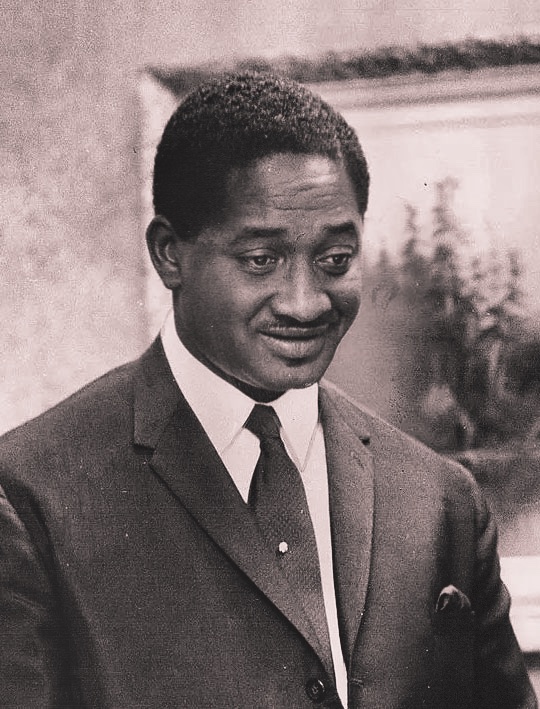GUYANA | Forde Lashes Gov't Legal Reform, Economic Management failures

GEORGETOWN, GUYANA, January 23, 2024 – In a scathing critique, Member of Parliament and Shadow Attorney General Roysdale Forde has lashed out at the Ali/Jagdeo administration for their egregious neglect in enhancing and fortifying Guyana’s constitutional and legal framework.
Opening the 2024 Budget Debate in the National Assembly on Monday, Forde accused the government of failing to undertake even the most fundamental reforms after four years in power.
Central to Forde's criticism is the administration's apparent dereliction in appointing a substantive Chancellor of the Judiciary and a substantive Chief Justice, a move he describes as a “travesty” and a “grave breach of the Constitution.”
His remarks echoed the concerns raised by Justice Adrian Saunders, President of the Caribbean Court of Justice (CCJ), who previously termed the situation a “notable stain on Guyana’s Judicial landscape.”
He also quoted a declaration by Justice Younge that: "For as long as there are no substantive appointments to the offices of Chancellor and Chief Justice under Article 127(1) of the Constitution, the President and the Leader of the Opposition are under a continuous mandatory constitutional duty and obligation to engage in a process which results in compliance with Article 127(1) of the Constitution.:
 Forde told the parliament that after 4 years in office, the President is still to initiate consultation under Article 127 (1) of the Constitution, which would lead to the appointments of a substantive Chancellor of the Judiciary and a substantive Chief Justice.
Forde told the parliament that after 4 years in office, the President is still to initiate consultation under Article 127 (1) of the Constitution, which would lead to the appointments of a substantive Chancellor of the Judiciary and a substantive Chief Justice.
The Shadow attorney general lamented that notwithstanding the Declaration by the High Court and the Caribbean Court of Justice’s exposition of the law that placed the President under a Constitutional Duty to initiate the process of consultation, ten months have elapsed since the decision without any discharge of the President’s Constitutional Duty to initiate the process of consultation.
Further exacerbating the issue, Forde highlighted the inactivity of the Law Reform Commission. Established in 2021 with a significant budget, the Commission, according to Forde, has failed to announce or initiate any significant law reform programs, reflecting a stagnation in the country’s legal evolution.
Forde also pointed to the inadequacy of legal aid, particularly for the underprivileged, and the government's failure to establish key commissions mandated by international conventions.
This includes the Human Rights Commission and the Petroleum Commission, crucial for maintaining ethical governance and transparency, especially in light of Guyana's burgeoning oil sector.
Former Auditor General Anand Goolsarran's statement on the lack of legal protection for whistleblowers was cited, emphasizing the government’s failure in ensuring transparency and fighting corruption.
On the economic front, Forde criticized the government's fiscal management, particularly in the context of the oil boom.

Forde’s address painted a grim picture of socioeconomic conditions in Guyana, with rising poverty rates and educational neglect. He condemned the government for not investing in human upliftment and for creating a budget that seemingly caters to the elite while overlooking the needs of the majority.
Forde urged a reevaluation of the government's approach, highlighting the necessity for evidence-based governance and greater fiscal responsibility. He stressed the need for policies that truly cater to the socio-economic advancement of all Guyanese, echoing the sentiments of the nation's founding figures for equality and justice.
In a striking condemnation of the administration's approach to legal and constitutional reforms, Forde accused the government of being oblivious to the urgent need for establishing a robust and independent judiciary. This neglect, he argued, directly undermines the rule of law, which is foundational for a democratic society.
Forde's assertions extend beyond the judiciary to the realm of law reform and governance. He lamented the lack of tangible progress by the Law Reform Commission, which was established as part of an $8 million IDB-funded Justice System Program.
The Commission's silence on law reform initiatives, Forde pointed out, signifies a missed opportunity for critical legal advancements in a rapidly changing society.
The critique did not spare the area of legal aid, where Forde highlighted a significant gap in service provision to the poor and vulnerable.
He envisioned a comprehensive Legal Aid Action Plan, underscoring the government's responsibility in ensuring access to justice for all, particularly for marginalized groups including women, children, and persons with disabilities.

In a broader economic context, Forde criticized the government for mismanaging the nation's finances, particularly in light of Guyana's status as the world's fastest-growing economy.
He pointed out the irony in the government's claims of avoiding the 'Dutch Disease' while its actions suggest the contrary – characterized by instability, corruption, and an overdependence on oil revenues.
This mismanagement, Forde argued, leads to social disparities and a failure to address the needs of the general populace.
Forde called for a fundamental shift in governance and budgetary processes and urged the government to adopt a more transparent, efficient, and evidence-based approach, aligning fiscal policies with the socio-economic needs of all Guyanese.
This, he asserted, is crucial for ensuring real progress and equity in a nation rich in resources but challenged by disparities and governance issues.
Mr. Forde ended his Budget Debate presentation, by paraphrasing a quote from former president Forbes Burnham who, in his contribution to the Budget Debate on 16th of January 1964 said: “The problems in Guyana are not the problems of the PPP or the problems of one section of the community, but the problems of the Guyanese people. And if we understand that, and face this problem in this spirit, I am sure that a more realistic attitude would be brought to the problems of this country. And that instead of sniping and swearing at those who fight to improve the economic and social position of Guyana, we should devote our effort to abolishing the reason for our poverty, backwardness, and degradation.”
-30-
